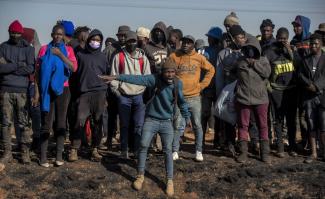State building
How to make African statehood more successful

A social contract is a reciprocal affair. The state must fulfil duties, such as ensuring public services and the rule of law. In return, citizens must accept duties too, such as paying taxes and obeying laws, which should be fair and just.
It is worrisome that, in Africa’s multi-ethnic societies, the general public’s understanding of both nationhood and citizenship tend to be rather weak. Government agencies do not provide good services, and masses of people identify neither with society nor the state.
According to UN statistics, Africa’s population will double by 2050. Nearly 41 % of the continent’s people are below the age of 15, while 15- to 24-year-olds constitute almost 20 %. The African Development Bank reported in 2020 that close to half of the employed youth perceived a mismatch between what their jobs require and what they had been taught. Most are either unemployed or underemployed.
Masses of youngsters are living in “waithood”. That is the period of suspension between childhood and adulthood. They have very little scope for making a difference in society and lack political representation. They are thus denied full citizenship, but long for opportunities and would much appreciate effective support. They are increasingly concentrated in major cities.
The UN Economic Commission for Africa has suggested that civic education might have a positive impact on the attitude of younger generations. Systematically informing young people about citizenship will not be enough, however. Governments must do more to educate the general public on issues of citizenship. As even members of the civil service are often ignorant, awareness-raising efforts should target them too. Cooperation with faith leaders, trade unions and other civil-society organisations would certainly help.
There is an even more fundamental challenge. If teaching people about how rights and duties interact is to make sense, government agencies must fulfil at least some of their obligations. An appropriate administrative infrastructure, for example, must allow everyone to register new-born children and acquire birth certificates. Keeping count of citizens is essential for providing adequate social services, from primary-school education to competent election-role management. Identity documents are useful for claiming rights, and they make people identify more with the central state.
The sad truth at this point, however, is that no African country has a complete birth registration system, though matters have been improving in many places. More generally speaking, social-systems have been making some progress too, and international financial institutions have supported the trend to some extent. History tells us that nation building was often reinforced by social-protection systems (see Markus Loewe in the Focus section of D+C/E+Z e-Paper 2018/11). When a state proves beneficial in daily life, its people begin to identify with it.
The human-rights scholar Bronwen Manby has pointed out that “citizenship is not just a legal concept but also a profoundly political question of self-definition”. She is right. Policymakers must pay attention to these matters if they want to consolidate sustainable states marked by strong social cohesion.
Reference
Melber, H., Bjarnesen, J., Hallberg Adu, K., Lanzano, C., Mususa, P., 2020: The politics of citizenship: social contract and inclusivity in Africa. Uppsala, Nordic Africa Institute.
http://nai.diva-portal.org/smash/get/diva2:1508597/FULLTEXT01.pdf
Henning Melber is a former research director of the Nordic Africa Institute and the director emeritus of the Dag Hammarskjöld Foundation. Both are based in Uppsala, Sweden. He is also extraordinary professor at the University of Pretoria and the University of the Free State in Bloemfontein.
henning.melber@nai.uu.se














